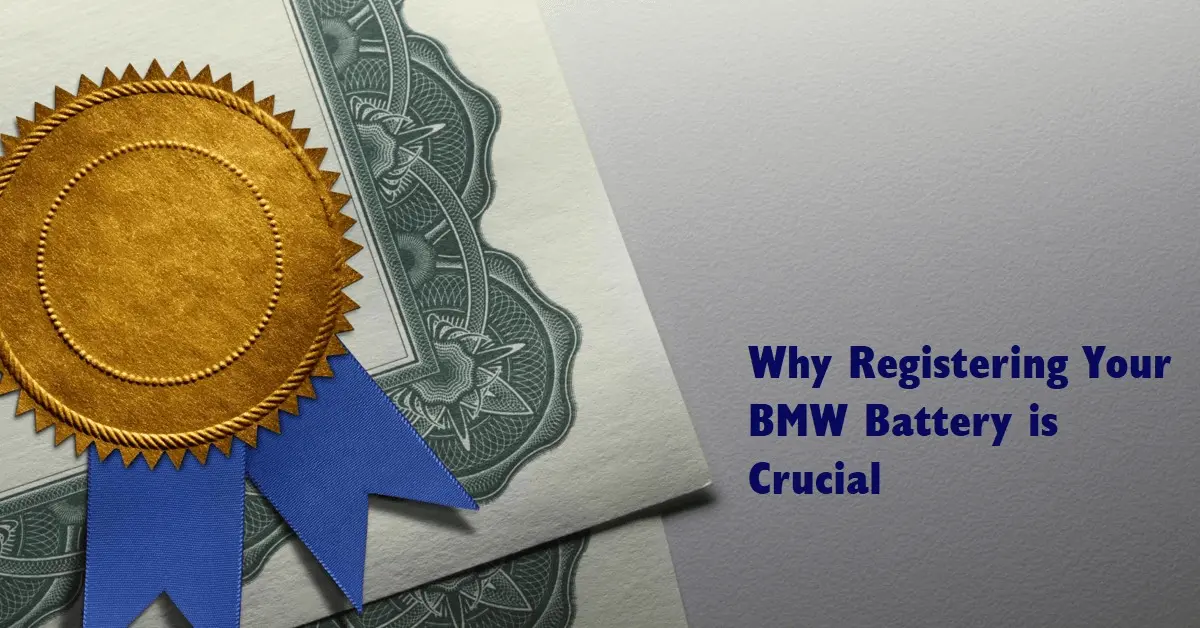Consequences of Not Registering a New BMW Battery
If you’ve just replaced the battery in your BMW, you may be wondering if it’s really necessary to have the new battery registered with the vehicle’s computer system. Some people try to skip this step to save a little money on the install. However, failing to properly register a new BMW battery can lead to a host of problems down the road, potentially costing you much more in reduced battery life, electrical issues, and related repairs.
In this comprehensive guide, we’ll take an in-depth look at what happens if you don’t register a new battery in your BMW, why this registration is so critical, and how to make sure it gets done right.
How BMW’s Intelligent Battery Sensor Works
To understand why battery registration is required, you first need to know about the Intelligent Battery Sensor (IBS) that BMW uses to monitor and manage the battery system.
The IBS constantly measures battery voltage, temperature, and other parameters every 14 seconds. It uses this data to determine the current state of charge and health of the battery.
The IBS system also adjusts the way the alternator charges the battery based on the age and condition of the battery. As batteries get older, their capacity decreases and they need to be charged more frequently to maintain optimal voltage. The IBS recognizes this and increases charging to compensate.
This variable charging approach serves two key purposes:
- Improves fuel efficiency by only running the alternator when needed instead of continuously. This reduces engine load.
- Maximizes battery life by optimizing the charge level and avoiding under or over-charging.
Clearly, the IBS plays a crucial role in fine-tuning the electrical and charging systems for optimal efficiency and performance.
Why Registration is Crucial With Battery Replacement
Here’s where the issue arises when you replace the battery in your BMW. The Intelligent Battery Sensor does not automatically recognize that a new battery has been installed. As far as it knows, the old battery is still being used.
This means the IBS will continue to charge the new battery based on the charging profile it had developed for the older battery. This almost always results in undercharging the new battery since an old battery needs more frequent charging.
Some of the consequences of not registering a new BMW battery include:
- The battery not being fully recharged, resulting in shortened lifespan.
- Difficulty starting the vehicle, especially in cold weather, as the battery lacks adequate power.
- Various electrical errors, glitches, and fault codes related to low system voltage. BMWs are very sensitive.
- Premature battery failure needing frequent replacement.
The proper registration process essentially “resets” the Intelligent Battery Sensor to recognize the new battery and develop an optimized charging profile for it. This allows the battery to be charged to its full capacity and last for years as designed.
Shortened Battery Life From Undercharging
One of the biggest problems caused by not registering your new BMW battery is dramatically shortened lifespan due to chronic undercharging.
As explained above, the IBS will think the new battery is old and apply an charging profile inadequate for a new battery. Over time, this will leave the new battery perpetually undercharged.
Being deprived of a full charge on a regular basis puts strain on the battery. The plates become sulfurized and the internal resistance increases. This leads to permanent loss of capacity.
What should be a long-lived and durable new battery will end up dying prematurely if undercharged. You’ll be continually buying new batteries that only last a fraction of their design life.
Properly registering the battery allows full charging capacity to be restored. This maximizes the lifespan of your new battery, often 5+ years with proper care and maintenance. Don’t throw your money away on undercharged batteries.
Electrical Errors and Fault Codes
Another consequence of an undercharged battery in a BMW is random electrical errors and fault codes. This expensive German engineering relies on proper voltage at all times to operate sensitive electronics and processors.
When the system voltage dips due to an undercharged battery, all sorts of erratic system behavior can result. You may experience:
- Odd warning lights and erroneous fault codes
- Instrument panel and infotainment glitches
- Start/stop and brake warning lights staying on
- Stability and traction control errors
- Transmission and gear selector issues
BMW’s complex network of modules are very interdependent. Low voltage in one part of the car can easily create cascading issues across multiple systems that all share data over the CAN bus network.
While the problems may seem random and completely unrelated to the battery, tracing back to the root cause often reveals chronic undercharging from a battery not properly registered. Don’t ignore warnings from your BMW electronics.
Necessity of Proper Registration Tools
Given the importance of accurately registering a new BMW battery, it’s critical to use proper tools designed for this task. While you can physically install the new battery yourself, registration involves interfacing with the digital systems.
Typically, you’ll need a scan tool that can access the vehicle’s OBD port and Intelligent Battery Sensor. Examples include:
- ISTA-D/P – BMW’s official scan software
- INPA – Used by many BMW shops
- Carly – Third party scan tool and app
- Bimmercode – Coding software with IBS functions
Don’t rely on the shop doing the install to register it properly unless they are experienced with BMWs and use approved tools. Many technicians at general repair shops, dealerships, and even BMW dealers are not familiar with IBS registration. It’s not intuitive or clearly documented.
Pay the extra cost to have a BMW specialty shop that uses the right software register your new battery. Or invest in one of the third-party tools to code it yourself properly. This small upfront cost can save you big in reduced problems and extended battery life.
Step-by-Step Registration Process
If you want to make absolutely sure your new BMW battery gets registered correctly, consider having a specialist shop or experienced mechanic walk you through the process before they begin.
Here is an overview of the key steps involved:
- Connect scan tool to vehicle’s OBD diagnostic port, usually located under the dash.
- Enter VIN and select proper model year, engine, and systems to access.
- Access battery management settings and Intelligent Battery Sensor menus.
- Reset all battery history data and charging profile settings.
- Confirm IBS recognizes battery as new and starts developing optimized profile.
- Clear any pending error codes related to battery or charging system.
- Perform various system tests to validate functionality.
- Verify charging system voltage is within specifications.
Watching the tech carefully go through these steps can give you confidence it’s done right. Be weary of any shop that claims registration is unnecessary or finished in under 60 seconds. Proper coding often takes 5-10 minutes. Don’t let them skip this invaluable step that keeps your new battery in top shape!
Other Critical Battery Coding Considerations
Keep in mind that properly coding and registering a new BMW battery involves more than just resetting the IBS if certain factors change with the new battery:
Battery Type – If you switch from a lead acid to AGM battery or vice versa, additional coding is required to match the charging profile to the different battery technology.
Capacity – If the new battery has a significantly higher or lower capacity (Ah) rating than the old, the maximum and minimum charging thresholds must be adjusted.
Failure to account for these changes in battery parameters will still result in under or overcharging, reducing life. Be sure your coder knows the details of your new battery and makes any necessary adjustments.
Warning Signs of Unregistered Battery
If you suspect that your recently replaced BMW battery was not properly registered, watch for these common indicators:
- Hard starting or slow cranking, especially in cold weather, signaling an undercharged battery.
- More frequent need to jump start or charge the battery.
- Battery dying well before its normal 5-7 year service life.
- Sporadic electrical failures, warning lights, system glitches pointing to low voltage.
- Messy history data and questionable readings from the battery sensor.
- No evidence of the required IBS reset programming being performed.
Don’t ignore these warning signs. Have a specialist test your charging system and battery to assess its state of charge and health. If the battery needs replacement every 1-2 years, registration was likely skipped. Get it coded properly this time.
FAQs on BMW Battery Registration
Let’s wrap up with answers to some frequently asked questions about coding a new BMW battery:
Do all new BMW batteries require registration?
All late model BMWs from 2002 on with the Intelligent Battery Sensor system need new batteries registered and coded. This applies to most models.
How soon after install does registration need to be done?
The battery should be registered immediately upon installation to prevent any periods of undercharging. At most, drive directly to the shop doing the coding if you cannot perform it yourself.
Can I register a battery myself without special tools?
Unfortunately no, you need an appropriate scan tool with BMW software to access the IBS and reset the data. DIY options include Bimmercode or a compatible OBD dongle with an app like Carly.
If my car starts fine, do I still need to register the battery?
Yes! Starting issues may not show up for months as the battery slowly becomes more undercharged. Coding it now prevents cumulative damage.
Will a dealership or auto parts store register my new battery?
Unlikely. As discussed above, many shops are not familiar with proper IBS coding procedures on BMWs. Verify beforehand that they will register it with the proper tools and steps.
Conclusion
Assuming that you can skip registering a new BMW battery to save a few bucks is an incredibly risky gamble. What seems like a small omission of convenience can cascade into a myriad of problems and expenses down the road.
Take the time and care to properly code your new battery on installation. This allows the IBS to optimize charging capacity and longevity, while avoiding electrical gremlins and repeated early battery failures.
Work with a trusted BMW specialist and use reputable tools designed for this task. Confirm the technician walks through all required steps with you beforehand. A few minutes and dollars spent now will reward you with years of optimized electrical operation and battery life.







